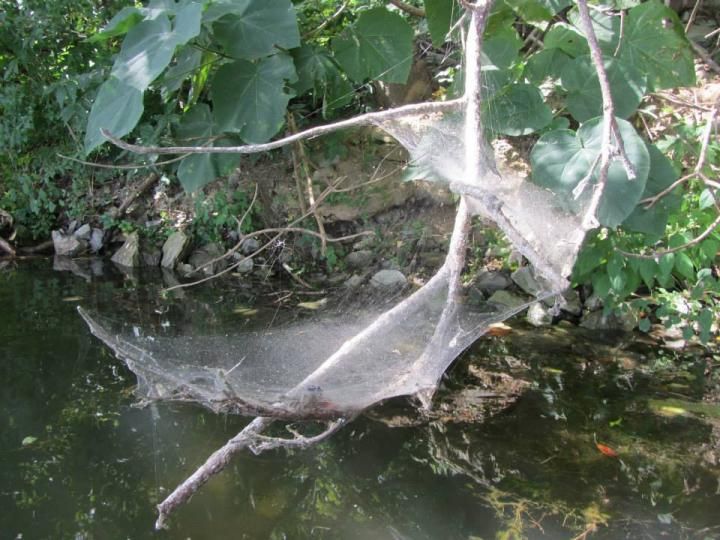Hurricanes Are Making This Spider Species More Aggressive
The new findings have broader implications for understanding extreme weather events’ effects on animal behavior
/https://tf-cmsv2-smithsonianmag-media.s3.amazonaws.com/filer/21/cd/21cdbd31-e0d5-414c-ae7c-b5458c95b074/208936_web.jpg)
In the aftermath of the 2018 hurricane season, aggressive colonies of spiders thrived, while predominantly docile groups struggled to survive.
As researchers led by Jonathan Pruitt of Ontario’s McMaster University report in the journal Nature Ecology and Evolution, this trend—documented during on-site expeditions to regions ravaged by Tropical Storm Alberto, Hurricane Florence and Hurricane Michael—suggests that the increasing prevalence of climate change-driven extreme weather events could have unexpected side effects on native wildlife. For Anelosimus studiosus specifically, the Miami Herald’s Alex Harris explains, hurricanes appear to act as a form of natural selection, shifting successful spider populations to the more aggressive end of the spectrum.
According to Wired’s Megan Molteni, A. studiosus—a type of small tangle web spider commonly found along the Gulf of Mexico and the United States’ Atlantic coast—is an unusually social arachnid. Whereas most spiders operate independently, A. studiosus lives and works in colonies of up to several hundred females. Per a 2014 study published in Nature, these colonies tend to be dominated by either aggressive “warriors” or docile “nannies”; in most cases, a colony’s collective aggression level has little effect on everyday life, but when resources grow scarce, aggressive groups often emerge on top, sacrificing the lives of a few to ensure the survival of the rest of the colony.
Speaking with the New York Times’ Kendra Pierre-Louis, Pruitt notes that aggressive females are skilled at capturing prey and defending their colonies.
“But they can’t really seem to turn off their aggression,” he adds. “So, sometimes they mistakenly kill their young and sometimes they mistakenly maim one of their fellow colony members.”

A. studiosus spiders pass down temperament traits to the next generation, making it likely that a population’s hurricane-selected aggression will continue for the foreseeable future rather than simply serving as a short-term adjustment. Interestingly, Molteni writes for Wired, the researchers discovered that the most warrior-like colonies seen at 13 study sites across the southeastern U.S. were based in areas with the highest historic exposure to cyclones.
To gauge the arachnid species’ aggressive tendencies, Pruitt wrapped a mechanical toothbrush in wire and used it to poke a piece of paper into A. studios spiders’ webs. As the scientist says to the Miami Herald’s Harris, the spiders found this paper, fluttering much like an ensnared insect, “irresistible.” Still, some were warier to approach the bait than others, leading Pruitt to label them as docile and their bolder counterparts as aggressive.
Per CNN’s Ashley Strickland, the team tracked members of 240 spider colonies before and after the three major storms. Regardless of storm duration, intensity and size, groups previously identified as aggressive were more likely to produce egg cases. Once hatched, these juveniles also boasted higher long-term survival rates. In areas unaffected by hurricanes, meanwhile, docile colonies tended to dominate.
If hurricanes become increasingly common occurrences, Pruitt predicts that A. studiosus may start moving away from its unusually interconnected lifestyle: “There’s a behavioral tipping point when very very aggressive colonies stop working together, start killing each other, and the group wisely disbands,” he explains to Inverse’s Emma Betuel. “Combine hurricane increases with global warming and I think you could get something like that.”
Matthew P. Ayres, a biologist at Dartmouth College who was not involved in the research, tells the Times’ Pierre-Louis that the implications of the new study “are much broader” than one might expect. Although this analysis focused specifically on spiders, previous research suggests the eight-legged creatures are far from the only animals to exhibit behavioral adaptations following extreme weather events.
“It is tremendously important to understand the environmental impacts of these 'black swan' weather events”—defined as surprising occurrences with effects only understood thanks to hindsight—“on evolution and natural selection,” Pruitt concludes in a statement. “As sea levels rise, the incidence of tropical storms will only increase. Now more than ever we need to contend with what the ecological and evolutionary impacts of these storms will be for non-human animal.”
/https://tf-cmsv2-smithsonianmag-media.s3.amazonaws.com/accounts/headshot/mellon.png)
/https://tf-cmsv2-smithsonianmag-media.s3.amazonaws.com/accounts/headshot/mellon.png)